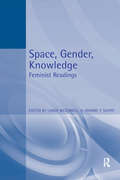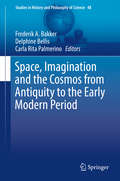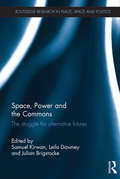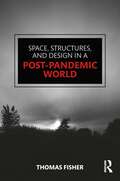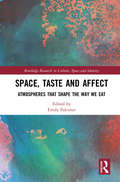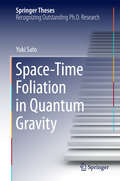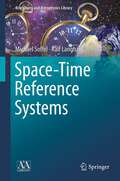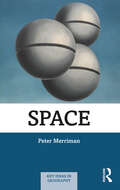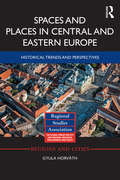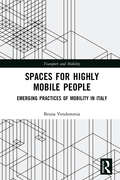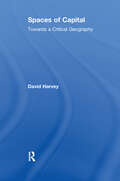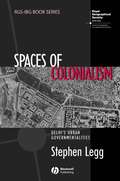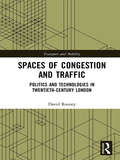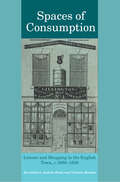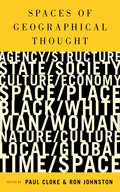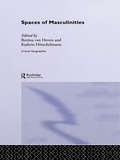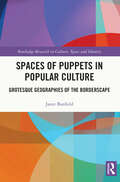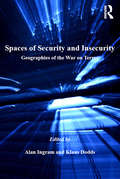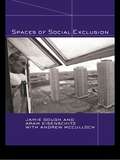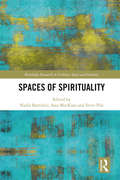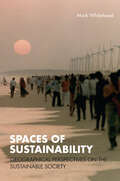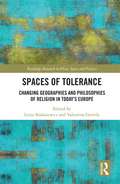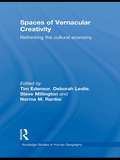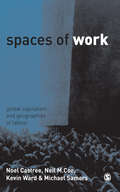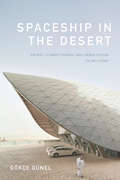- Table View
- List View
Space, Gender, Knowledge: Feminist Readings (Arnold Readers In Geography Ser.)
by Joanne P. Sharp Linda McDowell'Space Gender Knowledge' is an innovative and comprehensive introduction to the geographies of gender and the gendered nature of spatial relations. It examines the major issues raised by women's movements and academic feminism, and outlines the main shifts in feminist geographical work, from the geography of women to the impact of post-structuralism. In making their selection, the editors have drawn on a wide range of interdisciplinary material, ranging across spatial scales from the body to the globe. The book presents influential arguments for the importance of the intersection between space and gender. Looking both at geography and beyond the discipline, it explores the gendered construction of space and the spatial construction of gender. Divided into a number of conceptual sections, each prefaced by an editorial introduction, this reader includes extracts from both landmark texts and less well-known works, making it an indispensable introduction to this dynamic field of study.
Space, Imagination and the Cosmos from Antiquity to the Early Modern Period (Studies in History and Philosophy of Science #48)
by Frederik A. Bakker Delphine Bellis Carla Rita PalmerinoThis book is devoted to the analysis and applications of energy, exergy, and environmental issues in all sectors of the economy, including industrial processes, transportation, buildings, and services. Energy sources and technologies considered are hydrocarbons, wind and solar energy, fuel cells, as well as thermal and electrical storage. This book provides theoretical insights, along with state-of-the-art case studies and examples and will appeal to the academic community, but also to energy and environmental professionals and decision makers.
Space, Power and the Commons: The struggle for alternative futures (Routledge Research in Place, Space and Politics)
by Samuel Kirwan Leila Dawney Julian BrigstockeAcross the globe, political movements opposing privatisation, enclosures, and other spatial controls are coalescing towards the idea of the ‘commons’. As a result, struggles over the commons and common life are now coming to the forefront of both political activism and scholarly enquiry. This book advances academic debates concerning the spatialities of the commons and draws out the diverse materialities, temporalities, and experiences of practices of commoning. Part one, "Materialising the Commons" focuses on the performance of new geographical imaginations in spatial and material practices of commoning. Part two, "Spaces of Commoning", explores the importance of the turn from ‘commons’ to ‘commoning’, bringing together chapters focusing on the "doing" of commons, and how spaces, materials, bodies and abstract flows are intertwined in these complex and excessive processes. Part three, "An Expanded Commons", explores the broader registers and spaces in which the concept of the commons is at stake and highlights how and where the commons can open new areas of action and research. Part four, "The Capture of the Commons", questions the particular interdependence of ‘the commons’ and ‘enclosure’ assumed within commons literature framed by the concept of neoliberalism. Providing a comprehensive introduction to the diverse ways in which ideas of the commons are being conceptualised and enacted both throughout the social sciences and in practical action, this book foregrounds the commons as an arena for political thought and sets an agenda for future research.
Space, Structures and Design in a Post-Pandemic World
by Thomas FisherPandemics have long-term effects on how we live and work, and the COVID-19 pandemic was no exception, accelerating us into a digital economy, in which people increasingly work, shop, and learn online, transforming how we use space in-person and remotely. Space, Structures, and Design in a Post-Pandemic World explores the rebalancing of our physical and digital interactions and what it means for the built environment going forward. This book examines the effect of the pandemic on our use of land, interior space, energy, and transportation, as well as on our approach to design, wealth, work, and practice. Author Thomas Fisher also discusses the plagues of institutional racism and climate change that coincided with the COVID-19 pandemic and how these were interrelated. At the same time as all of this, the automation of all or part of many jobs continued unabated, eliminating much of the work that people did before COVID-19 arrived. This text discusses how we might leverage the under-utilized human talent and material assets all around us to rebuild our communities and our economy in more creative ways for a more equitable, resilient future. Space, Structures, and Design in a Post-Pandemic World will influence anyone interested in how design thinking can transform how we see the world and those looking for new ways to understand what the COVID-19 pandemic means and what opportunities it creates for our environments.
Space, Taste and Affect: Atmospheres That Shape the Way We Eat (Routledge Research in Culture, Space and Identity)
by Emily FalconerThis book is an exploration of how time, space and social atmospheres contribute to the experience of taste. It demonstrates complex combinations of material, sensual and symbolic atmospheres and social encounters that shape this experience. Space, Taste and Affect brings together case studies from the fields of sociology, geography, history, psycho-social studies and anthropology to examine debates around how urban designers, architects and market producers manipulate the experience of taste through creating certain atmospheres. The book also explores how the experience of taste varies throughout life, or even during fleeting social encounters, challenging the sense of taste as static. This book moves beyond common narratives that taste is ‘acquired’ or developed, to emphasize the role of psycho-social histories of nostalgia, memories of childhood, migration, trauma and displacement in the experience of we eat and drink. It focuses on entrenched social dimensions of class, value and distinction instead of psychological and neuroscientific conceptualizations of taste and sensuous practices of consumption to be intrinsically linked to the experience of taste in complex ways. This book will appeal to undergraduate and postgraduate students of sociology, human geography, tourism and leisure studies, anthropology, psychology, arts and literature, architecture and urban design.
Space-Time Foliation in Quantum Gravity
by Yuki SatoIn this thesis, the author considers quantum gravity to investigate the mysterious origin of our universe and its mechanisms. He and his collaborators have greatly improved the analyticity of two models: causal dynamical triangulations (CDT) and n-DBI gravity, with the space-time foliation which is one common factor shared by these two separate models. In the first part, the analytic method of coupling matters to CDT in 2-dimensional toy models is proposed to uncover the underlying mechanisms of the universe and to remove ambiguities remaining in CDT. As a result, the wave function of the 2-dimensional universe where matters are coupled is derived. The behavior of the wave function reveals that the Hausdorff dimension can be changed when the matter is non-unitary. In the second part, the n-DBI gravity model is considered. The author mainly investigates two effects driven by the space-time foliation: the appearance of a new conserved charge in black holes and an extra scalar mode of the graviton. The former implies a breakdown of the black-hole uniqueness theorem while the latter does not show any pathological behavior.
Space-Time Reference Systems
by Michael Soffel Ralf LanghansThe high accuracy of modern astronomical spatial-temporal reference systems has made them considerably complex. This book offers a comprehensive overview of such systems. It begins with a discussion of 'The Problem of Time', including recent developments in the art of clock making (e.g., optical clocks) and various time scales. The authors address the definitions and realization of spatial coordinates by reference to remote celestial objects such as quasars. After an extensive treatment of classical equinox-based coordinates, new paradigms for setting up a celestial reference system are introduced that no longer refer to the translational and rotational motion of the Earth. The role of relativity in the definition and realization of such systems is clarified. The topics presented in this book are complemented by exercises (with solutions). The authors offer a series of files, written in Maple, a standard computer algebra system, to help readers get a feel for the various models and orders of magnitude. Beyond astrometry, the main fields of application of high-precision astronomical spatial-temporal reference systems and frames are navigation (GPS, interplanetary spacecraft navigation) and global geodynamics, which provide a high-precision Celestial Reference System and its link to any terrestrial spatial-temporal reference system. Mankind's urgent environmental questions can only be answered in the context of appropriate reference systems in which both aspects, space and time, are realized with a sufficiently high level of accuracy. This book addresses all those interested in high-precision reference systems and the various techniques (GPS, Very Long Baseline Interferometry, Satellite Laser Ranging, Lunar Laser Ranging) necessary for their realization, including the production and dissemination of time signals.
Space: A Cultural-historical Geography Of England's M1 Motorway (Key Ideas in Geography #85)
by Peter MerrimanSpace is the first accessible text which provides a comprehensive examination of approaches that have crossed between such diverse fields as philosophy, physics, architecture, sociology, anthropology, and geography. The text examines the influence of geometry, arithmetic, natural philosophy, empiricism, and positivism to the development of spatial thinking, as well as focusing on the contributions of phenomenologists, existentialists, psychologists, Marxists, and post-structuralists to how we occupy, live, structure, and perform spaces and practices of spacing. The book emphasises the multiple and partial construction of spaces through the embodied practices of diverse subjects, highlighting the contributions of feminists, queer theorists, anthropologists, sociologists, and post-colonial scholars to academic debates. In contrast to contemporary studies which draw a clear line between scientific and particularly quantitative approaches to space and spatiality and more ‘lived’ human enactments and performances, this book highlights the continual influence of different mathematical and philosophical understandings of space and spatiality on everyday western spatial imaginations and registers in the twenty-first century. Space is possibly the key concept underpinning research in geography, as well as being of central importance to scholars and practitioners working across the arts, humanities, social sciences, and physical sciences.
Spaces and Places in Central and Eastern Europe: Historical Trends and Perspectives (Regions and Cities)
by Gyula HorváthAcross Europe there is a rapidly changing context for undertaking regional development. In the 20th century, development of the former planned economies (Bulgaria, Czech Republic, Hungary, Poland, Romania and Slovakia), was defined by these countries differences, rather than their common ideological roots. These disparities altered over time and were marked by changing social structures. However, the ranking of regions has remained the same as core areas have strengthened their positions while the structural obstacles to the modernisation of peripheral areas have remained due to a lack of coherent regional policy. This book examines the specific regional development paths of Central and Eastern European countries and evaluates the effects of the determining factors of this process. Through analysis of the system of objectives, instruments and institutions used in different eras, and case studies of Hungary, East Germany and Germany, development models are established and compared with Western European patterns. The book summarises the experiences of Central and Eastern European regional cooperation and examines the basic nature of the cohesion problems of the Carpathian Basin trans-national macro region. It confirms by comparative historical analyses that the transformation was indeed unique. This book will make a welcome addition to the literature for students and academics interested in the broader picture of Central and Eastern European politics, future integration within the European Union and the history of regional development processes.
Spaces for Highly Mobile People: Emerging Practices of Mobility in Italy (Transport and Mobility)
by Bruna VendemmiaThis book explores how emerging mobility practices have transformed spaces in order to fit the needs of highly mobile people, as well as the changing relationship between people and territory. It establishes an interdisciplinary and a multiscalar approach to mobility analysis and mobility design through the application of a mobile method of research. Drawing on mobile people in Italy, the book highlights how influential movers appropriate and configure space for their own needs, centring their activities on continuous but distant places and configuring territories with uncertain and evolving limits. This change of perspective allows us to redefine the concept of mobility space, including all the spaces that support the development of emerging mobility practices. It also encourages new perspectives on the way in which the relationship between the individual and territory is evolving into a less sedentary way of inhabiting space. This book will be of interest to architects, urban scientists and sociologists, as well as postgraduate students who are interested in understanding how mobilities are transforming contemporary cities and territories.
Spaces of Capital: Towards a Critical Geography
by David HarveyDavid Harvey is the most influential geographer of our era, possessing a reputation that extends across the social sciences and humanities. Spaces of Capital, a collection of seminal articles and new essays spanning three decades, demonstrates why his work has had-and continues to have-such a major impact. The book gathers together some of Harvey's
Spaces of Colonialism: Delhi's Urban Governmentalities (Rgs-ibg Book Ser.)
by Stephen LeggExamines the residential, policed, and infrastructural landscapes of New and Old Delhi under British Rule. The first book of its kind to present a comparative history of New and Old Delhi Draws on the governmentality theories and methodologies presented in Michel Foucault’s lecture courses Looks at problems of social and racial segregation, the policing of the cities, and biopolitical needs in urban settings Undertakes a critique of colonial governmentality on the basis of the lived spaces of everyday life
Spaces of Congestion and Traffic: Politics and Technologies in Twentieth-Century London (Transport and Mobility)
by David RooneyThis book provides a political history of urban traffic congestion in the twentieth century, and explores how and why experts from a range of professional disciplines have attempted to solve what they have called ‘the traffic problem’. It draws on case studies of historical traffic projects in London to trace the relationship among technologies, infrastructures, politics, and power on the capital’s congested streets. From the visions of urban planners to the concrete realities of engineers, and from the demands of traffic cops and economists to the new world of electronic surveillance, the book examines the political tensions embedded in the streets of our world cities. It also reveals the hand of capital in our traffic landscape. This book challenges conventional wisdom on urban traffic congestion, deploying a broad array of historical and material sources to tell a powerful account of how our cities work and why traffic remains such a problem. It is a welcome addition to literature on histories and geographies of urban mobility and will appeal to students and researchers in the fields of urban history, transport studies, historical geography, planning history, and the history of technology.
Spaces of Consumption: Leisure and Shopping in the English Town, c.1680–1830
by Victoria Morgan Jon Stobart Andrew HannConsumption is well established as a key theme in the study of the eighteenth century. Spaces of Consumption brings a new dimension to this subject by looking at it spatially. Taking English towns as its scene, this inspiring study focuses on moments of consumption – selecting and purchasing goods, attending plays, promenading – and explores the ways in which these were related together through the spaces of the town: the shop, the theatre and the street. Using this fresh form of analysis, it has much to say about sociability, politeness and respectability in the eighteenth century.
Spaces of Geographical Thought: Deconstructing Human Geography's Binaries (Society And Space Ser.)
by Ron Johnston Paul J. ClokeSpaces of Geographical Thought examines key ideas - like space and place - which inform the geographic imagination. The text: discusses the core conceptual vocabulary of human geography: agency: structure; state: society; culture: economy; space: place; black: white; man: woman; nature: culture; local: global; and time: space; explains the significance of these binaries in the constitution of geographic thought; and shows how many of these binaries have been interrogated and re-imagined in more recent geographical thinking. A consideration of these binaries will define the concepts and situate students in the most current geographical arguments and debates. The text will be required reading for all modules on the philosophy of geography and on geographical theory.
Spaces of Masculinities (Critical Geographies #Vol. 20)
by Kathrin Hörschelmann HovenChanging circumstances in Western and global societies have introduced new constraints and opportunities for men and the formation of male identities. Meanwhile, the emerging diversity of 'atypical' identities ('atypical' when compared with traditional conceptions of middle-class, white, heterosexual men) poses new challenges for the production and use of spaces. Spaces of Masculinities provides a comprehensive introduction to the innovative and diverse research on spaces of masculinity. Drawing on a variety of geographical research projects, the central concern of the book is to highlight the significance of research on masculinity in sociological and geographical work dealing with constructions of gender.
Spaces of Puppets in Popular Culture: Grotesque Geographies of the Borderscape (Routledge Research in Culture, Space and Identity)
by Janet BanfieldThis first book-length exploration of geographical engagement with puppets examines constructions of puppets in contemporary popular British culture and considers the various ways in which puppets and humans (not just puppeteers) are unified in diverse cultural media. Organised around themes of metaphorical, performative and transformational puppets, the work draws out how puppets are used in diverse cultural media (fiction, music, television, film and theatre), how they are constructed through those uses, and to what effect. Both puppets as generalised forms (bodily, relational or ideational) and specific puppet characters (Mr Punch, Pinocchio) are explored. Building upon existing associations between puppets and the grotesque, the volume extends understandings of the puppet by elaborating borderscaping strategies through which puppets are constructed and an alternative perspective on the uncanniness of puppets. Geographically, it unearths distinct puppet spatialities, identifies the socially critical potential of puppets, rescales geo/bio-politics at the interpersonal level, and highlights the potential of puppets within posthuman debates about the status of the human. This work will be of interest to anyone fascinated by puppets, as well as those in fields such as geography, anthropology, cultural and media studies, and those interested in the grotesque, posthumanism and/or non-representational scholarship.
Spaces of Security and Insecurity: Geographies of the War on Terror (Critical Geopolitics)
by Alan IngramDrawing on critical geopolitics and related strands of social theory, this book combines new case studies with theoretical and methodological reflections on the geographical analysis of security and insecurity. It brings together a mixture of early career and more established scholars and interprets security and the war on terror across a number of domains, including: international law, religion, migration, development, diaspora, art, nature and social movements. At a time when powerful projects of globalization and security continue to extend their reach over an increasingly wide circle of people and places, the book demonstrates the relevance of critical geographical imaginations to an interrogation of the present.
Spaces of Social Exclusion
by Jamie Gough Aram Eisenschitz Andrew McCullochTo varying extents in developed countries a minority of the population suffers from deprivation. Britain’s Labour government in particular has sought to deal with this through the notion of 'social exclusion', and similar ideas have been developed in other countries. This important text explores the various forms of this contemporary economic and social disadvantage and, in particular, investigates its social and spatial causes and the role of space in policies addressing disadvantage. Arranged in three distinct parts, it: introduces contemporary and historical conceptualizations of social exclusion and poverty analyzes social exclusion’s origins by examining the different spheres of disadvantage and their relations discusses strategies for overcoming social exclusion, and analyzes policy ideas from across the political spectrum. This book is the first to systematically analyze the role of geography in poverty and social exclusion, and deals with the roles of ‘globalization’ and localism. Though its main focus is Britain, it investigates similarities and differences in other developed countries. Spaces of Social Exclusion is a key text for researchers and students throughout the social sciences, social policy, human geography and urban studies, as well as policy makers and practitioners in social and urban policy.
Spaces of Spirituality (Routledge Research in Culture, Space and Identity)
by Steve Pile Nadia Bartolini Sara MacKianSpirituality is, too often, subsumed under the heading of religion and treated as much the same kind of thing. Yet spirituality extends far beyond the spaces of religion. The spiritual makes geography strange, challenging the relationship between the known and the unknown, between the real and the ideal, and prompting exciting possibilities for charting the ineffable spaces of the divine which lie somehow beyond geography. In setting itself that task, this book pushes the boundaries of geographies of religion to bring into direct focus questions of spirituality. By seeing religion through the lens of practice rather than as a set of beliefs, geographies of religion can be interpreted much more widely, bringing a whole range of other spiritual practices and spaces to light. The book is split into three sections, each contextualised with an editors’ introduction, to explore the spaces of spiritual practice, the spiritual production of space, and spiritual transformations. This book intends to open to up new questions and approaches through the theme of spirituality, pushing the boundaries on current topics and introducing innovative new ideas, including esoteric or radical spiritual practices. This landmark book not only captures a significant moment in geographies of spirituality, but acts as a catalyst for future work.
Spaces of Sustainability: Geographical Perspectives on the Sustainable Society
by Mark WhiteheadSpaces of Sustainability is an engaging and accessible introduction to the key philosophical ideas which lie behind the principles of sustainable development. This topical resource discusses key contemporary issues including global warming, third world poverty, transnational citizenship and globalization. Combining the latest research and theoretical frameworks Spaces of Sustainability offers a unique insight into contemporary attempts to create a more sustainable society and introduces the debates surrounding sustainable development through a series of interesting transcontinental case studies. These include: discussions of land-use conflicts in the USA; agricultural reform in the Indian Punjab; environmental planning in the Barents Sea; community forest development in Kenya; transport policies in Mexico City; and political reform in Russia. Written in an approachable and concise manner, this is essential reading for students of geography, planning, environmental politics and urban studies. It is illustrated throughout with figures and plates, along with a range of explanatory help boxes and useful web links.
Spaces of Tolerance: Changing Geographies and Philosophies of Religion in Today’s Europe (Routledge Research in Place, Space and Politics)
by Valentina Gentile Luiza BialasiewiczThis book offers interdisciplinary and cross-national perspectives on the challenges of negotiating the contours of religious tolerance in Europe. In today’s Europe, religions and religious individuals are increasingly framed as both an internal and external security threat. This is evident in controls over the activities of foreign preachers but also, more broadly, in EU states’ management of migration flows, marked by questions regarding the religious background of migrating non-European Others. This book addresses such shifts directly by examining how understandings of religious freedom touch down in actual contexts, places, and practices across Europe, offering multidisciplinary insights from leading thinkers from political theory, political philosophy, anthropology, and geography. The volume thus aims to ground ideal liberal democratic theory and, at the same time, to bring normative reflection to grounded, ethnographic analyses of religious practices. Such ‘grounded’ understandings matter, for they speak to how religions and religious difference are encountered in specific places. They especially matter in a European context where religion and religious difference are increasingly not just securitised but made the object of violent attacks. The book will be of interest to students and scholars of politics, philosophy, geography, religious studies, and the sociology and anthropology of religion.
Spaces of Vernacular Creativity: Rethinking the Cultural Economy (Routledge Studies in Human Geography #Vol. 30)
by Tim Edensor Deborah Leslie Steve Millington Norma M. RantisiCreativity has become part of the language of regeneration experts, urban planners and government policy makers attempting to revive the economic and cultural life of cities in the 21st century. Concepts such as the creative class, the creative industries and bohemian cultural clusters have come to dominate thinking about how creativity can contribute to urban renewal. Spaces of Vernacular Creativity offers a critical perspective on the instrumental use of arts and creative practices for the purposes of urban regeneration or civic boosterism. Several important contributions are brought into one volume to examine the geography of locally embedded forms of arts and creative practice. There has been an explosion of interest in both academic and policy circles in the notion of creativity, and its role in economic development and urban regeneration. This book argues for a rethinking of what constitutes creativity, foregrounding non-economic values and practices, and the often marginal and everyday spaces in which creativity takes shape. Drawing on a range of geographic contexts including the U.S., Europe, Canada and Australia, the book explores a diverse array of creative practices ranging from art, music, and design to community gardening and anticapitalist resistance. The book examines working class, ethnic and non-elite forms of creativity, and a variety of creative spaces, including rural areas, suburbs and abandoned areas of the city. The authors argue for a broader and more inclusive conception of what constitutes creative practice, advocating for an approach that foregrounds economies of generosity, conviviality and activism. The book also explores the complexities and nuances that connect the local and the global and finally, the book provides a space for valuing alternative, marginal and displaced knowledges. Spaces of Vernacular Creativity provides an important contribution to the debates on the creative class and on the role of value of creative knowledge and skills. The book aims to contribute to contemporary academic debates regarding the development of post-industrial economies and the cognitive cultural economy. It will appeal to a wide range of disciplines including, geography, applied art, planning, cultural studies, sociology and urban studies, plus specialised programmes on creativity and cultural industries at Undergraduate and Postgraduate levels.
Spaces of Work: Global Capitalism and Geographies of Labour
by Kevin Ward Noel Castree Neil Coe Mike SamersSpaces of Work is an accessible examination of the role of labour in the modern world. The authors critically assess the present condition and future prospects for workers through the geographies of place, space and scale, and in conjunction with other more commonly studied components of the globalisation such as production, trade and finance. Each chapter presents examples of labour practice from around the world, and across multiple sectors of work, not just Western manufacturing. In addition, the book features: · further reading section with key questions · glossary of key terms · short summaries of the main theoretical approaches · guide to further learning resouces Spaces of Work is a key book for all social scientists interested in the contemporary state of labour, and the scope for progressive change within the capitalist system. Students of human geography, sociology, international political economy, economics and cultural studies will all find this an invaluable text.
Spaceship in the Desert: Energy, Climate Change, and Urban Design in Abu Dhabi (Experimental Futures)
by Gökçe GünelIn 2006 Abu Dhabi launched an ambitious project to construct the world’s first zero-carbon city: Masdar City. In Spaceship in the Desert Gökçe Günel examines the development and construction of Masdar City's renewable energy and clean technology infrastructures, providing an illuminating portrait of an international group of engineers, designers, and students who attempted to build a post-oil future in Abu Dhabi. While many of Masdar's initiatives—such as developing a new energy currency and a driverless rapid transit network—have stalled or not met expectations, Günel analyzes how these initiatives contributed to rendering the future a thinly disguised version of the fossil-fueled present. Spaceship in the Desert tells the story of Masdar, at once a “utopia” sponsored by the Emirati government, and a well-resourced company involving different actors who participated in the project, each with their own agendas and desires.
